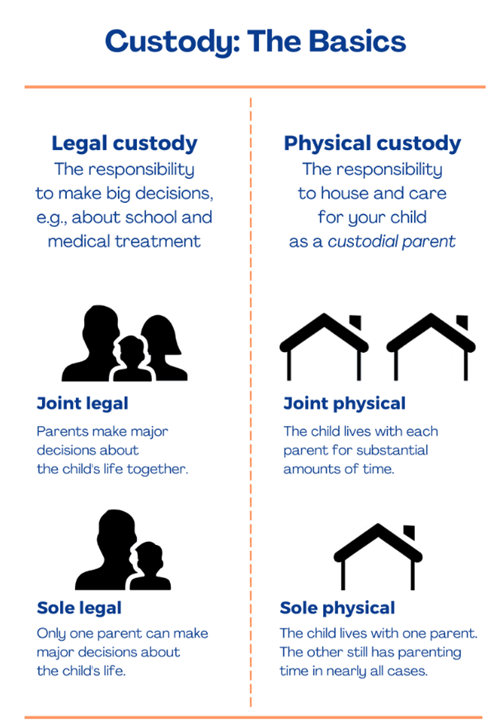Your spouse might be laying the groundwork for divorce by displaying certain behaviors and actions.…

Child Custody and the Court
In a child custody case, the primary goal is to determine what’s in the best interests of the child or children. The court bases its decision on:
- Physical, emotional, and psychological needs
- The child’s preference, depending on their age
- The child’s relationship with each parent
- History of domestic violence
- Other relevant factors
The focus must be on the child’s best interest and providing a safe, stable, and nurturing environment, not winning or losing a custody case. Still, there are tips for parents to present themselves and their family’s situation in custody court.
Keep your Parental House in Order
How you conduct yourself, and your lifestyle will speak volumes to the court system. Parents who demonstrate steady employment and maintain a wholesome, kid-friendly environment are typically well-equipped to provide a stable and reliable home for their children.
Watch how you engage with your child’s other parent. Like it or not, keeping a positive co-parenting relationship greatly benefits your child. Short of abuse, both parents have a right to be part of their child’s life. Any frustrations or anger you may experience belong in discussions with a therapist or a very few tight-lipped friends and family. Avoid ranting on social media about the situation.
Stay positively engaged with your child as you honor parental responsibilities and exercise your rights to remain in their world. Remember that divorcing or separating from your child’s other parent doesn’t always solve problems, but it will change them. Child custody is an ongoing issue that you may need to modify in the future, so work hard to keep things from escalating.
Child Custody Laws Vary by State
It is important to familiarize yourself with your state’s child custody practices. The laws are the foundational tools that permit you to build a strong case. There are several key issues to pay close attention to, including:
- Definitions of different custody types
- Laws about paternity, if you are unmarried
- Custodial rights
- Rules of evidence
- Terminology
While you don’t have to understand everything, look for what applies to your case. To get a feel for your state’s child custody laws, retain the services of a family law attorney specializing in child custody issues.

A family law attorney can provide legal representation and guidance in your child custody case. They will help you navigate the legal process and understand your rights and responsibilities.
What a Family Law Attorney does
Representing your case in child custody court in the best light possible requires a family law attorney. There are specific tasks that your lawyer will perform during a child custody case, including the following:
- Advise you on the laws and regulations of your state that govern child custody, including the factors that the court will consider when making a custody determination.
- Assist you in preparing and filing necessary legal documents, such as petitions or motions for custody.
- Represent you in court and present your case to the judge, arguing for your desired custody arrangement and presenting evidence to support your position.
- Communicate with the other party and their attorney to negotiate a custody agreement that is in the child’s best interests.
- Prepare and file legal documents to modify a custody order if circumstances change.
- Represent you in mediation or other alternative dispute resolution proceedings.
- Provide you with legal advice and guidance throughout the process, including advising you on the potential outcome of your case and the steps you can take to protect your rights and interests.
- Help you understand the legal process, including the rules of evidence, court procedures, and the different stages of the litigation process.
- Help you understand what to expect in court and how to prepare yourself.
- Represent your interest with the court to help obtain a fair and just outcome for you and your child.
Your Parent Responsibilities to Present well in Court
While you work with your attorney to create a parenting plan, determine the needed evidence to back up your claims, and perhaps role-play to prepare your response to questions the court may ask, you must also consider personal preparation, including:
- Focus – The court will base its decision on the child’s best interest, so keep that in mind when making decisions for presenting your case.
- Preparation – Gather all relevant documents, such as birth certificates and medical and school records, and stay apprised of your state’s child custody laws.
- Parent – Be a responsible and involved parent who shows the court you can provide a safe, stable, and nurturing environment for the child.
- Evidence – Provide evidence to the court of your parenting skills, such as school records, medical records, and testimony from teachers, doctors, counselors, and other professionals who observe your relationship with the child.
- Cooperation – Show the court that you are willing to cooperate with the other parent and work toward a custody arrangement that is in the child’s best interests.
- Seek Help – Don’t go it alone. Your lawyer can be especially helpful in a complex or contentious custody case. Lean into their legal expertise.
- Compliance – If the court issues an order, follow it. Failure to do so can result in negative legal consequences.
- Compromise – Be willing to consider different custody arrangements and be open to compromise. The chances of getting everything you want are slim.
- Consistency and Stability – Demonstrate these attributes in your living situation, employment, financial situation, and parenting.
- Respect – Address the judge as “Your Honor” and speak respectfully to the other party and their attorney. Show the court that you understand the gravity of the situation and are willing to work towards a positive outcome for the child.
Take away
Sometimes, parents may agree on a custody arrangement in the child’s best interests, and the court will approve it. In other cases, the court may order a custody arrangement that neither parent is completely happy with but is in the child’s best interests.
It is important to remember that you can always modify custody arrangements if circumstances change and the existing plan is no longer in the child’s best interests. It is also worth noting that one parent may be the primary physical custodial parent and the other secondary. Sometimes both parents may share joint physical custody. The key is to find a solution ensuring the child’s best interest and safety.
Finally, it is crucial to have realistic expectations and understand that a child custody case is not about winning or losing but ensuring the child’s safety, well-being, and best interest. Ultimately the more fully you and your lawyer represent your custody case for the benefit of the child, the greater the likelihood you will be satisfied with the court’s decision.
This article summarizes aspects of family law. It is not legal advice and does not create an attorney-client relationship. For legal advice, please contact our Houston office today at (713) 582-5088 or schedule a consultation.




